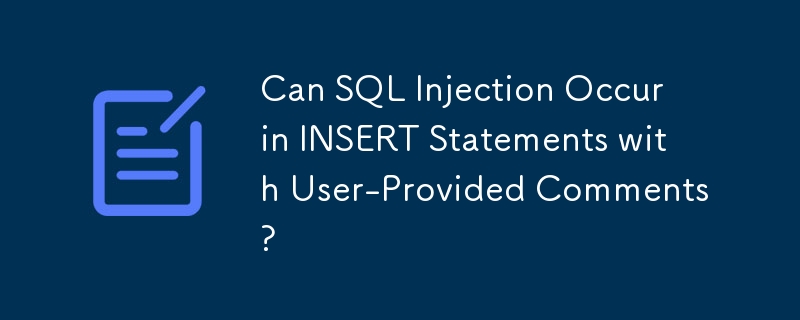

SQL Injection on INSERT with Textbox Comments
Despite the misconception that SQL injection attacks are limited to external access, they can occur even in internal applications like web surveys. This article explores the risks associated with SQL injection attacks on INSERT statements involving textbox comments and provides guidelines for protecting against them using .NET 2.0.
Can SQL Injection Happen on INSERT Statements with Comments?
Yes, SQL injection is possible on any improperly executed SQL statement, including INSERT statements. If user input in the textbox comment field is directly concatenated into the SQL query without proper sanitization, malicious code can be introduced into the statement.
How to Guard Against SQL Injection in .NET 2.0
To mitigate SQL injection attacks in .NET 2.0, it is essential to use parameterized SQL statements. This technique involves passing input values as parameters to a prepared SQL statement rather than directly inserting them into the query string. By doing so, the parameterized SQL statement effectively separates user input from the SQL statement, preventing malicious code from being executed.
Example
Consider the following vulnerable INSERT statement:
string comment = Request.Form["comment"]; string sql = "INSERT INTO Comments VALUES (123, '" + comment + "')";
In this example, the user-provided comment is directly concatenated into the SQL statement, leaving it vulnerable to SQL injection attacks.
Protecting Against Injection
To protect against SQL injection, rewrite the statement using a parameterized SQL statement:
using (SqlConnection connection = new SqlConnection(connectionString))
{
string sql = "INSERT INTO Comments VALUES (123, @comment)";
using (SqlCommand command = new SqlCommand(sql, connection))
{
command.Parameters.AddWithValue("comment", Request.Form["comment"]);
command.ExecuteNonQuery();
}
}In this code, the user input is passed as a parameter named @comment, and the SqlParameter.AddWithValue method ensures that the value is properly escaped and treated as a parameter.
Conclusion
Implementing parameterized SQL statements is a crucial step in safeguarding against SQL injection attacks. By separating user input from SQL queries, you can maintain good coding practices and protect your web application from malicious activity.
The above is the detailed content of Can SQL Injection Occur in INSERT Statements with User-Provided Comments?. For more information, please follow other related articles on the PHP Chinese website!




